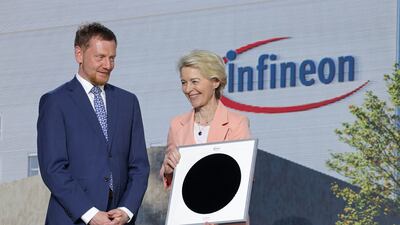The EU needs to boost production of semiconductors and minimise reliance on imports from countries such as Taiwan and South Korea, the head of the European Commission Ursula von der Leyen said in a speech in Germany on Tuesday.
“We need more mass production here in Europe,” said Ms von der Leyen at the opening of a new plant owned by German semiconductor producer Infineon Technologies in Dresden. The factory will produce semiconductors “on a large scale” from 2026, she added.
The Covid-19 pandemic and Europe’s abrupt reduction of Russian energy imports after Moscow’s invasion of Ukraine last year have incentivised the continent to become more self-reliant.
Brussels last year announced a €43 billion ($47 billion) plan — the Chips Act — to boost its semiconductor industry and catch up with the US and Asia.
Ms von der Leyen described semiconductors, electronic chips used in products including wind turbines and smartphones, as “an indispensable component in Europe’s sustainable and digital future”.
South Korea and Taiwan are the world’s main producers of semiconductors.
Yet “tensions can flare up at any time” in the region, Ms von der Leyen warned, in an apparent reference to recent fears of a Chinese invasion of Taiwan.
“The slightest disruption to trade would immediately hit Europe’s strong industrial base and our internal market hard,” she said.
“We are all experiencing how drastically geopolitical risks have grown. This is why it is vital that we in Europe strengthen the supply chains of our most important goods and technologies.”
The EU’s relations with China are currently tense and worsened after Beijing’s assertion of a “no-limits” friendship with Russia’s President Vladimir Putin.
In a visit to China in March, Ms von der Leyen warned China’s relations with Russian would “be a determining factor for EU-China relations going forward”. She described Beijing as “becoming more repressive at home and more assertive abroad”.
The Chinese capital last month held a three-day military drill after a meeting between Taiwan’s President Tsai Ing Wen and US House Speaker Kevin McCarthy.
In Dresden, Ms von der Leyen highlighted that China accounts for 76 per cent of the silicon metals commonly used in chip production. “This dependence on individual raw material suppliers is a risk,” she said.
In a sign of tensions between China and the West, Dutch semiconductor giant ASML was pressured by the US into restricting exports of some equipment to China. ASML dominates the market for lithography equipment used for making semiconductors.
European leaders such as French President Emmanuel Macron have made repeated calls for Europe to boost its industry as China and the US launch mass industrial support programmes.
Ms von der Leyen invited the EU to develop partnerships with countries it perceives as sharing the same values, including Australia, the US and Canada, to create alternatives.
“The push towards globalisation in recent decades has seen the economic regions of the world focus too much on their own strengths," she said. "For example, Europe has developed its expertise in research and development, and in industrial applications.
“However, what has long been far from a priority is the mass production of semiconductors, without which everything will ultimately grind to a halt.”


